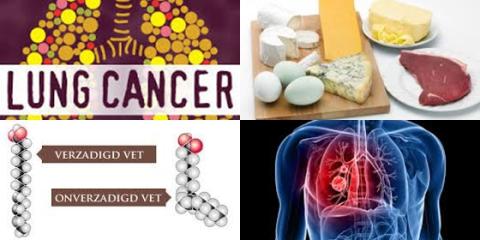
Objectives:
Dietary fat may play a role in lung carcinogenesis. Findings from epidemiologic studies, however, remain inconsistent. Therefore, this review article (meta-analysis) has been conducted.
Is there an association between dietary fat intake and the risk of lung cancer?
Study design:
This review article included 10 prospective cohort studies with a total of 1,445,850 participants, of which 18,822 incident cases (subjects with lung cancer).
The mean follow-up was 9.4 years.
Results and conclusions:
The investigators found high intakes of total fat were associated with a 7% significant increased risk of lung cancer [for highest v lowest quintile: HR = 1.07, 95% CI = 1.00 to 1.15].
The investigators found high intakes of saturated fat were associated with a 14% significant increased risk of lung cancer [for highest v lowest quintile: HR = 1.14, 95% CI = 1.07 to 1.22].
The investigators found high intakes of saturated fat were associated with a 23% significant increased risk of lung cancer among current smokers [for highest v lowest quintile: HR = 1.23, 95% CI = 1.13 to 1.35, p for trend 0.001].
The investigators found high intakes of saturated fat were associated with a 61% significant increased risk of squamous cell lung cancer [for highest v lowest quintile: HR = 1.61, 95% CI = 1.38 to 1.88].
The investigators found high intakes of saturated fat were associated with a 40% significant increased risk of small cell carcinoma lung cancer [for highest v lowest quintile: HR = 1.40, 95% CI = 1.17 to 1.67].
The investigators found a high intake of polyunsaturated fat was associated with a 8% significant decreased risk of lung cancer [for highest v lowest quintile: HR = 0.92, 95% CI = 0.87 to 0.98, p for trend = 0.02].
The investigators found a 5% energy substitution of saturated fat with polyunsaturated fat was associated with a 16% and 17% lower risk of small cell and squamous cell carcinoma, respectively.
The investigators found no associations for monounsaturated fat.
The investigators concluded that high intakes of polyunsaturated fat decrease risk of lung cancer, while high intakes of saturated fat increase risk of lung cancer, particularly among smokers and for squamous cell and small cell carcinoma.
Original title:
Dietary Fat Intake and Lung Cancer Risk: A Pooled Analysis by Yang JJ, Yu D1, […], Shu XO.
Link:
https://www.ncbi.nlm.nih.gov/pubmed/28742456
Additional information of El Mondo:
Find more information/studies on fat and cancer right here.
A daily diet with high intakes of saturated fat is a diet that is largely made up of meals/products with more than 10 En% saturated fat, with a small part of meals/products with less than 10 En% saturated fat. Practically, this means that all meals/products that you eat on a daily basis should contain on average more than 10 En% saturated fat.
Check here which products contain more than 10% En% saturated fat.
A daily diet with low intakes of saturated fat is a diet that is largely made up of meals/products with less than 7 En% saturated fat, with a small part of meals/products with more than 7 En% saturated fat. Practically, this means that all meals/products that you eat on a daily basis should contain on average less than 7 En% saturated fat.
Check here which products contain less than 7% En% saturated fat.